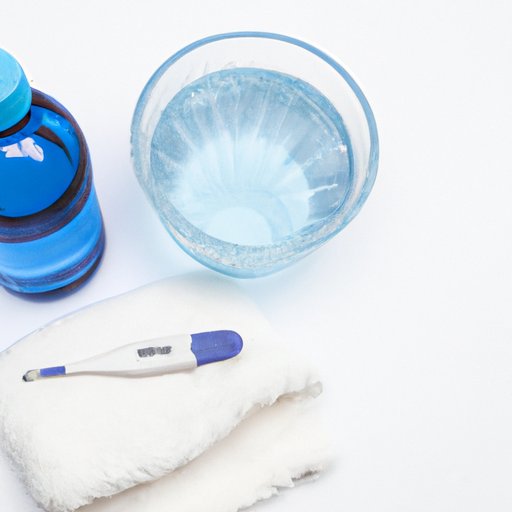
I. Introduction
Fevers are a common occurrence in our lives, and while they can be concerning, they are not a cause for alarm. A fever happens when our body’s internal temperature goes above its regular range due to infection or other illnesses. It is our body’s defense mechanism to fight off these infections. In this article, we will provide you with tips and tricks to bring down your fever easily and effectively.
II. Use A Cold Compress
Using a cold compress is a simple and effective way to bring down your fever. A cold compress works by reducing the temperature of the skin, which, in turn, cools down the body temperature.
Take a washcloth and soak it in cool, not cold water. Wring out the excess water, fold it and place it on your forehead, neck, or wrists. The cooling sensation of the washcloth will help make you feel better and reduce your temperature.
While using a cold compress, make sure you don’t use ice or frozen items directly on your skin, as it could cause skin irritation and damage. Do not use this method if you are already shivering or have a low body temperature.
III. Hydration Is Key
Hydration is crucial when running a fever. Staying hydrated can help replenish fluids lost through sweating and lower your body temperature.
Drink plenty of fluids during a fever, plain water is an excellent choice. Fresh fruit juices, coconut water and broths are also good options. However, avoid alcoholic and caffeinated beverages, as they can cause dehydration and, in some cases, worsen some symptoms.
IV. Take A Lukewarm Bath
A lukewarm bath is a tried-and-true method to help reduce a fever. It works by soaking in water with a balanced temperature, causing the body to cool down.
Fill a bathtub with lukewarm water, aim for temperatures between 94 and 98°F. Soak in the tub for 10-15 minutes, and use a washcloth to wipe your forehead continuously. Don’t use cold water in hopes of a quicker reduction. This can cause shivering and increase your body temperature in response.
Be careful not to soak in hot water as this can increase your temperature. Be cautious and mindful of weak water quality or possible allergens, especially if the water supply isn’t filtered or treated before use.
V. Comfortable Clothing Is Essential
The right clothing choice can make a difference when dealing with a fever. Wear lightweight clothing, preferably made of natural, breathable fabrics that help your body temperature regulate better.
Avoid heavy, tight, or synthetic fabrics that might trap the heat in, as it will make you feel uncomfortable and can increase your body temperature. Dress in comfortable fabrics that aren’t tight or restrictive when lying down in bed.
VI. Over-the-counter Medication
Over-the-counter medications can help alleviate fever and other symptoms that come with various illnesses. These medications work by interrupting the production of certain chemicals, lowering your temperature, and improving overall symptoms.
Common fever-reducing over-the-counter medications like Acetaminophen, Ibuprofen, and Aspirin could help. Make sure to follow the instructions on the label as dosages could vary between different products and brands.
Bear in mind that taking any medication can have side effects. It is important to read the label carefully, avoid mixing different medications, and only use medication if symptoms are strong enough to require their use.
VII. Rest As Much As Possible
Rest is another crucial aspect that affects getting a fever under control. Resting allows your body to conserve energy and focus on fighting the infection.
No rigorous activity or exertion. Stay well-rested both day and night. Try to stay horizontal lying down to relax your body and rest comfortably. Remember to keep your room temperature comfortable with enough fresh air circulating.
VIII. Seek Medical Attention When Necessary
While most fevers go away on their own, some fevers could be severe and require medical attention. If your fever lasts more than three days, seek medical attention from a doctor.
Symptoms of trouble that need immediate attention include difficulty breathing, chest pain, severe headaches, stiff neck, seizures, unrelenting vomiting, confusion, and sensitivity to bright light.
You may expect a medical examination during a check-up, which could include a physical exam, bloodwork, or a more extensive analysis based on each case.
IX. Conclusion
Getting a fever is never pleasant, yet managing it is not as complicated as it may seem. Using these tips and tricks for reducing fever can help you alleviate the discomfort and help you recover faster.
Remember to stay hydrated, get enough rest, wear comfortable clothes, use a cold compress, take medication, and monitor your symptoms. And when in doubt, always consult a health professional.
Take it easy and be mindful of your body when a fever is present, and don’t forget to be proactive with all of these easy steps.




